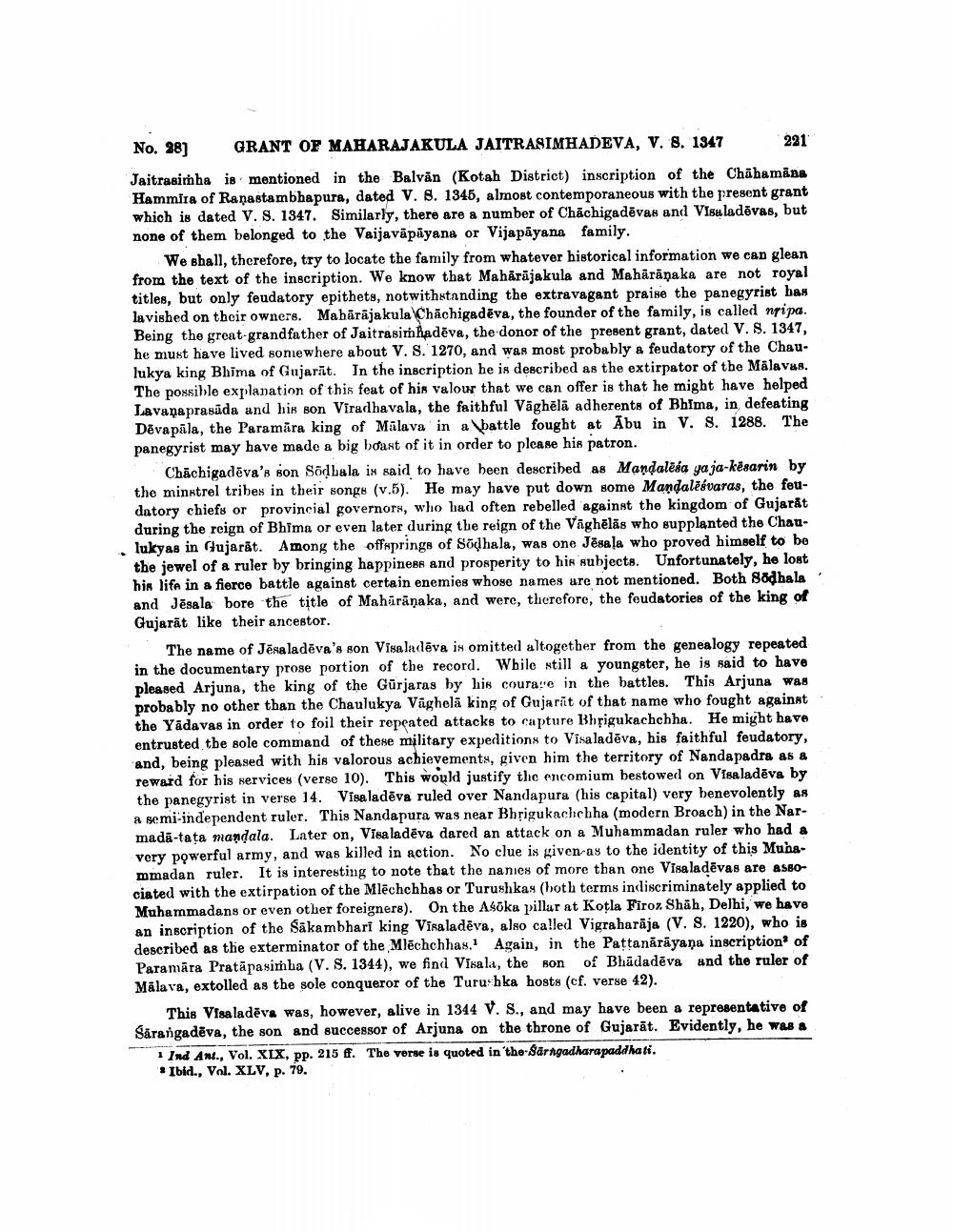________________
No. 28]
GRANT OP MAHARAJAKULA JAITRASIMHADEVA, V. 8. 1347
221
Jaitrasimha is mentioned in the Balvan (Kotah District) inscription of the Chäbamans Hammira of Ranastambhapura, dated V. 8. 1345, almost contemporaneous with the present grant which is dated V. S. 1347. Similarly, there are a number of Chāchigadēvas and Visu ladēvas, but none of them belonged to the Vaijavāpāyana or Vijapāyana family.
We shall, therefore, try to locate the family from whatever historical information we can glean from the text of the inscription. We know that Mahārājakula and Mahārānaka are not royal titles, but only feudatory epithets, notwithstanding the extravagant praise the panegyrist has lavished on their owners. Mahārājakula Chächigadēva, the founder of the family, is called nripa. Being the great-grandfather of Jaitrasimhadēva, the donor of the present grant, dated V. S. 1347, he must have lived soniewhere about V. S. 1270, and was most probably a feudatory of the Chaulukya king Bhima of Gujarat. In the inscription he is described as the extirpator of the Mālavas. The possible explanation of this feat of his valour that we can offer is that he might have helped Lavanaprasūda and his son Viradhavala, the faithful Vāghēlā adherents of Bhima, in defeating Dēvapāla, the Paramāra king of Mālava in a battle fought at Abu in V. 8. 1288. The panegyrist may have made a big boast of it in order to please his patron.
Chichigadēva's son Södbala is said to have been described as Mandalesa ya ja-kësarin by the minstrel tribes in their songs (v.5). He may have put down some Mandalēsvaras, the feudatory chiefs or provincial governors, who had often rebelled against the kingdom of Gujaråt during the reign of Bhima or even later during the reign of the Vāghēlās who supplanted the Chaulukyas in Gujarat. Among the offsprings of Södhala, was one Jēsala who proved himself to be the jewel of a ruler by bringing happiness and prosperity to his subjects. Unfortunately, he lost his life in a fierce battle against certain enemies whose names are not mentioned. Both Sodhala and Jēsala bore the title of Mahārāņaka, and were, therefore, the feudatories of the king of Gujarāt like their ancestor.
The name of Jēna ladēva's son Visaladēva is omitted altogether from the genealogy repeated in the documentary prose portion of the record. While still a youngster, he is said to have pleased Arjuna, the king of the Gurjaras by his courage in the battles. This Arjuna was probably no other than the Chaulukya Vaghela king of Gujarat of that name who fought against the Yādavas in order to foil their repeated attacks to capture Bhrigukachchha. He might have entrusted the sole command of these military expeditions to Visaladēva, his faithful feudatory, and, being pleased with his valorous achievements, given him the territory of Nanda padra as & reward for his services (verse 10). This would justify the encomium bestowed on Visaladēva by the panegyrist in verse 14. Visaladēva ruled over Nandapura (his capital) very benevolently as a semi-independent ruler. This Nandapura was near Bhrigukachchha (modern Broach) in the Narmadā-tata mandala. Later on, Visaladēva dared an attack on a Muhammadan ruler who had a very powerful army, and was killed in action. No clue is given-ay to the identity of this Munammadan ruler. It is interesting to note that the nanies of more than one Visaladēvas are associated with the extirpation of the Mlēchchhas or Turushkas (both terms indiscriminately applied to Muhammadans or even other foreigners). On the Asoka pillar at Kotla Firoz. Shāh, Delhi, we have an inscription of the Sākambhari king Virala dēva, also called Vigraharāja (V. S. 1220), who is described as the exterminator of the Mlēchchhas. Again, in the Pattanārāyana inscription of Paramāra Pratārasimha (V. S. 1344), we find Visala, the son of Bhādadēva and the ruler of Mälava, extolled as the sole conqueror of the Turu hka hosts (cf. verse 42).
This Visala dēva was, however, alive in 1344 V. S., and may have been a representative of Sárangadēva, the son and successor of Arjuna on the throne of Gujarat. Evidently, he was a 1 Ind Ant., Vol. XLX, pp. 215 ff. The verse is quoted in the Sarngadharapaddhati.
Ibid., Vol. XLV, p. 79.




